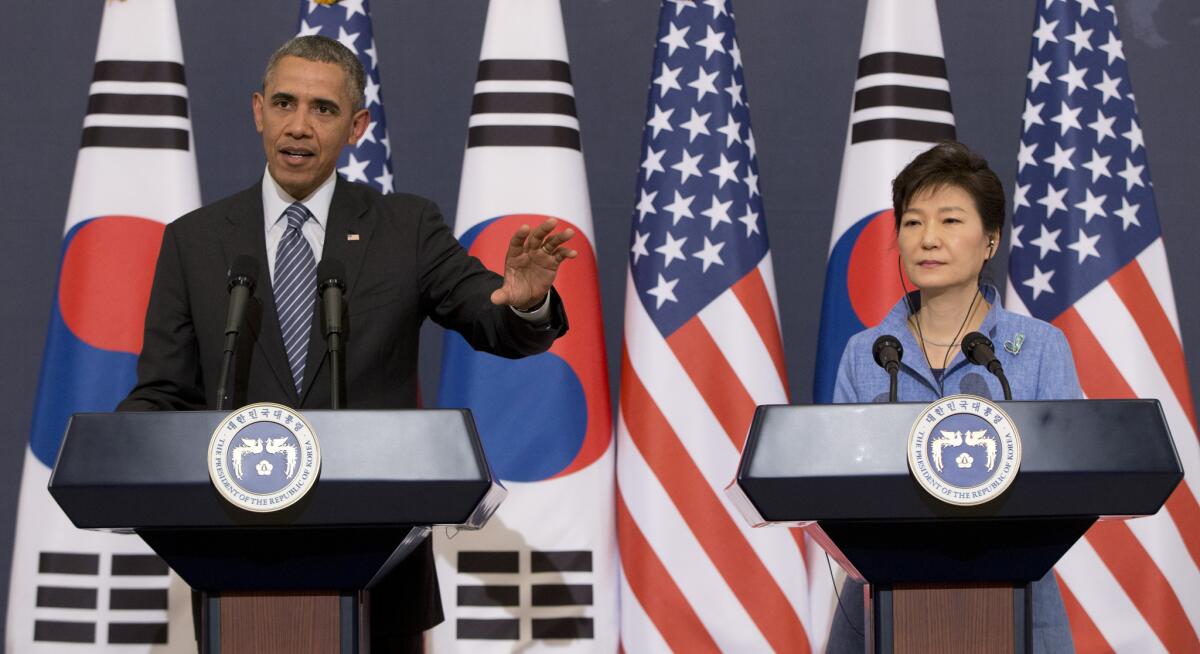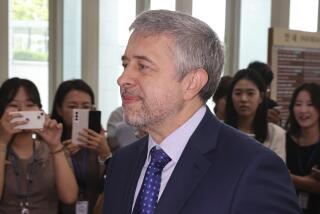Obama counsels diplomacy in dealing with Russia, China, North Korea

SEOUL -- President Obama conceded Friday that sanctions on Russia may not force President Vladimir Putin to alter his decisions on Ukraine, but he then offered a spirited defense of how they might still influence a leader he said is “not a stupid man.”
Putin surely realizes that sanctions have hurt the Russian economy, Obama said, and knows there is much more pain ahead if he doesn’t live up to his pledge to ease tensions in Ukraine, where Russian-speaking people in the eastern regions continue to challenge Kiev’s authority.
“President Putin is not a stupid man,” Obama said. “Is he willing to see the Russian economy ... weakened further because he is unwilling to deal with Ukraine in a diplomatic fashion that respects their sovereignty?”
Despite signs of Russia’s role in the ongoing turmoil in Ukraine, Obama said, the international community “shouldn’t make the choice easy for him.”
The remarks, delivered during a news conference here, reflect Obama’s belief that Putin is a rational leader who will curb his behavior if it makes sense for him to do so.
But as the day’s telephone diplomacy revealed, raising the stakes for Russia will be no light matter for Obama and European allies. Germany and Italy are particularly concerned about the potential impact on their own economies if they expand the sanctions already in place.
Although Obama’s weeklong trip to Asia is aimed in part at conveying the theme of U.S. military readiness in the region, his explicit message throughout has been about using diplomatic tools to respond to threats from Russia, China and North Korea.
In talks with Japanese and South Korean leaders, Obama counseled a policy of peaceful conversation about territorial disputes. In the wake of news that Israel will pull out of U.S.-brokered peace talks with the Palestinians, Obama said he isn’t yet ready to throw in the towel.
In Seoul, the concern about the nuclear threat is urgent, given the volatility of the North Korean regime and its spring season of missile testing.
After a series of meetings with Obama on Friday, South Korean President Park Geun-hye told reporters she was confident of the U.S. commitment to deterrence. For his part, in the joint news conference that followed their private session, Obama emphasized the power of sanctions.
He urged a “consistent, steady approach” and a search for “further sanctions that have even more bite,” bearing in mind that “we are not going to find a magic bullet that solves this problem.”
He did not suggest, however, that North Korean leader Kim Jong Un was a rational actor. But when asked about Putin, Obama’s analysis was rather personal.
Mirroring a question recently put to Putin, ABC correspondent Jon Karl asked Obama if he would save the Russian leader if he were drowning. Obama replied that he would, just as he would with anyone in that kind of peril.
The real lifeline for Putin, Obama suggested, would be to honor his commitments in Geneva and end Russia’s growing isolation. Tens of billions of dollars in capital are fleeing the country, Obama said, and soon “no businessman or woman with any sense is going to want to invest there.”
In his public diplomacy so far this week, Obama has taken care to avoid offending his hosts but has also kept in mind their complicated relationships with neighbors. In a news conference with the Japanese prime minister, for example, he hastened to advise patience and cooperation in working out territorial disputes with China.
Asked about the tensions between Japan and South Korea over the abduction and sexual assault of Korean women during World War II, Obama quickly affirmed his belief that the women were victims of atrocious war crimes that call for acknowledgment and remorse.
“Those women were violated in ways that, even in the midst of war, was shocking,” Obama said. “They deserve to be heard, they deserve to be respected. There should be an accurate and clear account of what happened.”
At the same time, he said, Japan and South Korea must “find ways in which the heartache and pain of the past can be resolved.”
“My hope would be that we can honestly resolve some of these past tensions,” he said, “but also keep our eye on the future.”
Twitter: @cparsons
More to Read
Sign up for Essential California
The most important California stories and recommendations in your inbox every morning.
You may occasionally receive promotional content from the Los Angeles Times.











